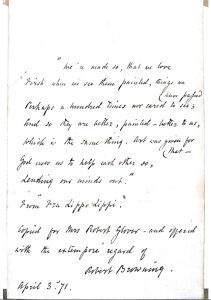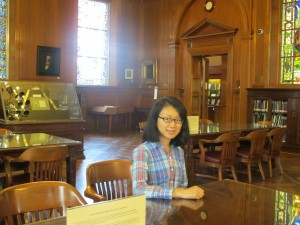By Li “Gloria” Liu, PhD candidate, Hunan Normal University, Changsha, China
I am Li “Gloria” Liu, a PhD student from Hunan Normal University, Changsha, China,majoring in English language and literature. My special interest lies in Robert Browning and his dramatic monologues. Right now I am drafting some chapters of my dissertation. I was fortunate to be awarded a visiting scholarship from September to October 2016 at Armstrong Browning Library and the one-month stay has left me many wonderful memories.
I had been expecting to visit ABL for quite some time for it is one of the most prestigious libraries on Robert Browning. Then my interest was further increased by a professor who told me that this library was a “shrine” to Browning scholars. ABL’s fellowship made my dream come true, so I am greatly appreciative of this precious opportunity. The place is indeed a shrine (for the detailed introduction to its architecture and decoration style, click here). What strike me most are the beautiful stained glass windows, on each of which there are lines extracted from the Brownings’ famous poems. Each piece tells a story and has a style of its own. The artifacts on exhibit are closely related to the poets and their family, including Robert’s ring, letters addressed to relatives and friends, as well as their manuscripts. In one of the drawers of the cabinet in the Treasure Room, there is a portrait drawn by his son (Pen Browning), picturing Robert in a very amusingly arrogant posture. Precious materials of this kind cannot be seen elsewhere. It seems to me that the exhibits try to convey the great poets’ concerns in life, endeavoring to recapture the scene of them working their way to prove that “man’s reach should exceed his grasp” (“Andrea del Sarto,” 97).
One of the most exciting experiences at ABL is to gain access to the rare materials, such as manuscripts and unpublished items. The revisions of works made by Robert Browning are certainly valuable to study, for they reveal the poet’s working process and changing attitudes, as is shown in The Ring and the Book. The poems destroyed by him but accidentally survived in his friends’ hand-copies are also of great value, like his juvenile poem “The Dance of Death,” copied by Sara Flower in her letter to W. J. Fox. Reading his manuscripts, I reached a clearer idea of the development of Browning’s aesthetics, which is of immense importance to me because my dissertation focuses on the transitional role Browning serves between Romanticism and Modernism. Besides, getting in touch with their manuscripts triggers my greater interest in the poets. Browning’s handwriting is difficult for me, especially when he scribbled, which was quite the usual case with him. In contrast, he wrote neatly when he copied his poems (though always short lines). One can perhaps conclude that when he was thinking fast, he wrote fast. I also wondered what the fact may tell us about Elizabeth Barrett Browning that, when doing the final proofreading of her Sonnets from the Portuguese for the publisher in 1856, she copied those poems in their entirety instead of just making the slight changes they needed, as most poets would generally do.
There are whole sets of reference books on the shelf in Belew Scholars’ Room on the third floor, including all series of authoritative texts, comprehensive sets of letters, and the newest publications, etc. The Brownings’ Correspondence not only has an index book for greater convenience, but has full texts in the computer. One just needs to type in the keywords and he can accurately locate the original text. I have also collected all Browning bibliographies from 1971 to 2001, which succeed the two bibliography books tracing back to the year of 1830.
The staff of ABL are very nice and generous to help me. Interim Director Jennifer Borderud is patient and considerate of every bit of my concern. Right after my arrival, Curator of Books and Printed Materials Cynthia Burgess helped with all the necessary information for the use of the library. Not only so, she even printed for me the information of articles and books she thought might be important for my dissertation. It was thirty pages long and very helpful. Every time I requested an item Assistant to the Curators Melvin Schuetz immediately helped me to get it, sometimes even with some other supporting documents. The supporting documents were very useful, because they generally offered greater background information than my knowledge could allow. When I had questions, I would always ask them for help. The most admirable way of their help was that they could provide detailed and accurate information within texts. Graduate Assistant Melinda Creech is very resourceful with my questions and concerns. Discussions with her about poetry and some other related topics were also enjoyable.

Robert Browning, Fra Lippo Lippi, quotation of lines 300–306, “Copied for Mrs. Robert Glover,” 3 April 1871.
I am very thankful to Dr. Joshua King, Margarett Root Brown Chair in Robert Browning and Victorian Studies, who enlightened me with important criticism on my research and suggestions about my argument development. I am especially struck by his reminding me of my neglect of two larger pictures concerning the dramatic monologue as a genre. He also kindly invited me to have lunch with him even in his tight schedule. The conversation with him was wonderful. I was greatly inspired by his way of thinking. His vision is wide and deep. I also enjoyed very much the discussion with him about some poems by Andrew Motion, former English Poet Laureate who was recently invited to give his poetry reading at ABL. It is so nice of Professor King to offer further help if I have more questions.
When I speak of being fortunate to be at ABL, I do not refer only to the opportunity of conducting researches here, but also of meeting people working here. The ABL staff and faculty of Baylor University in general have greatly impressed me with their way of working and living. Shortly after my arrival, I was kindly invited to join Rita Patteson’s retirement party, the Director of ABL since 2009. I was amazed when I found that she had worked at ABL for 45 years. Her persistent and specialized devotion to both the Brownings and the library is admirable and has made Browning studies even more fascinating. Besides, I also met many professors who are her life-long friends at the reception. The lasting and close friendship among the like-minded people is always a dream for me. What a happy and meaningful life they must have lived!
I owe a lot of thanks to Administrative Coordinator Christi Klempnauer, especially the first week when I suddenly had skin rash. I must apologize for calling her at 5:00 am when the illness became serious, but she always kindly and repeatedly assured me that “I am so glad you called me.” She took me to hospital whenever I needed and was so concerned about my condition that she texted me every short period to make sure of my well-being. She is more than a friend to me. Everyone at ABL has been very nice and kind. They always made me feel welcome and comfortable. Their easy and intimate relationship makes ABL a big happy family.
Furthermore, there are many wonderful cultural events at ABL, even though I am told that September is not the busiest month for such events. Besides the wonderful poetry reading by Andrew Motion, I also had the privilege of enjoying a concert, given by St. Martin’s Voices, a world-level professional choral team and Baylor Bella Voce together. Their music was so beautiful that it deeply touched my heart.
I am thankful to be able to come here and have been happy during my stay. The ABL has allowed me to be with excellent scholars in this field, who have shown to me that doing academic researches, even on such obscure and difficult writer as Robert Browning, could be fun and worthy of life-long passions. The wonderful memories of my stay, I believe, will serve as “life and food” (Wordsworth, “Tintern Abbey,” 65-6) for my future years.
To learn more about the Armstrong Browning Library’s Visiting Scholars Program, visit our website.

